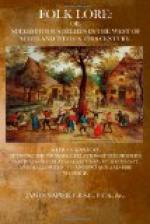“Rise up, gudewife, and shake
your feathers,
Dinna think that we are beggars,
We’re girls and boys
come out to-day,
For to get our Hogmanay,
Hogmanay,
trol-lol-lay.
“Give us of your white bread,
and not of your gray,
Or else we’ll knock
at your door a’ day.”
This rhyme has a stronger reference to Yule or Christmas than to the New Year, and is doubtless a relic of pre-Reformation times.
At the Reformation, the Scottish Church, probably following the dictum of Calvin, who condemned Yule as a pagan festival, forbade the people to observe it because of its heathen origin; but probably the more potent reason was that it was a Romish feast, for no objection was made against keeping the New Year or hansell Monday, on which occasion practices similar to those of Yule were observed, and I believe it was the non-condemnation of these later festivals which enabled the Scottish Church to abolish Yule. In fact, it would appear that the Yule practices were simply transferred from a few days earlier to a few days later, and thereby retained their original connection with the close of the year. Prior to the Church interference there is no evidence that the first of January was observed by the people as a general feast, but even with this safety valve of a popular and yearly festival, the Church encountered great difficulty in abolishing Yule. A few instances of the opposition of the people will suffice.
The Glasgow Kirk Session, on the 26th December, 1583, had five persons before them who were ordered to make public repentance, because they kept the superstitious day called Yule. The baxters were required to give the names of those for whom they had baked Yule bread, so that they might be dealt with by the Church. Ten years after this, in 1593, an Act was again passed by the Glasgow Session against the keeping of Yule, and therein it was ordained that the keepers of this feast were to be debarred from the privileges of the Church, and also punished by the magistrates.
Notwithstanding these measures, the people still inclined to observe Yule, for fifty-six years after, in 1649, the General Assembly appointed a commission to make report of the public practices, among others, “The druidical customs observed at the fires of Beltane, Midsummer, Hallowe’en, and Yule.” In the same year appears the following minute in the session-book of the Parish of Slains.—(See Rust’s Druidism Exhumed.)
26th Nov., 1649.—“The said day, the minister and elders being convened in session, and after invocation of the name of God, intimate that Yule be not kept, but that they yoke their oxen and horse, and employ their servants in their service that day as well as on other work days.”




